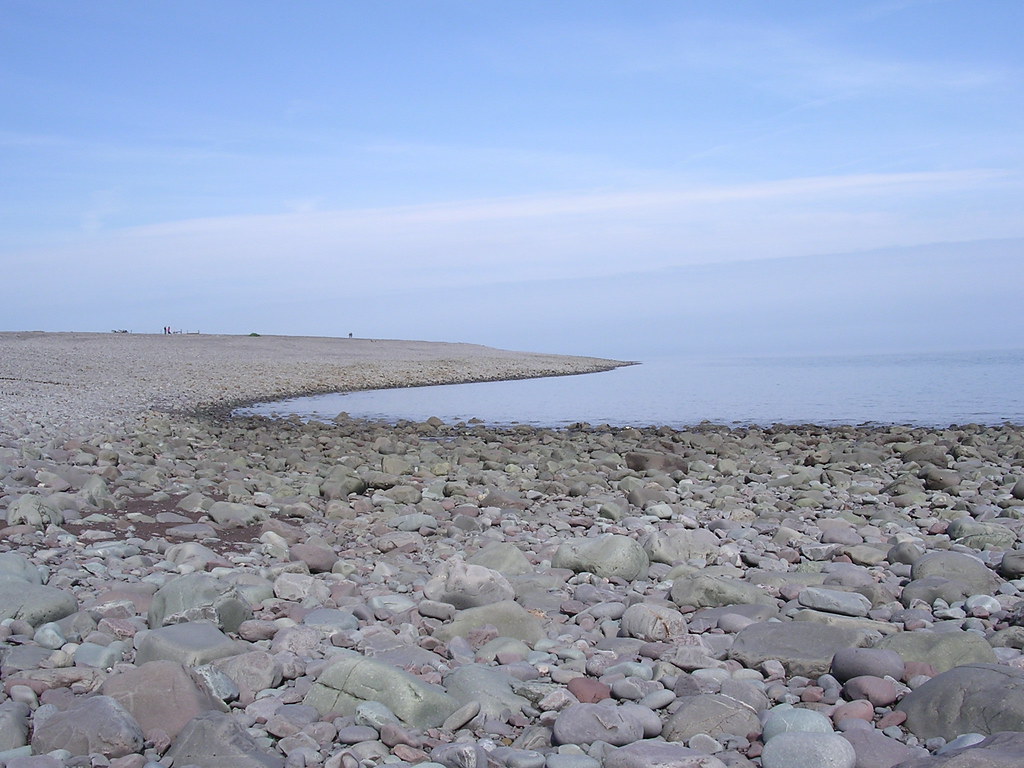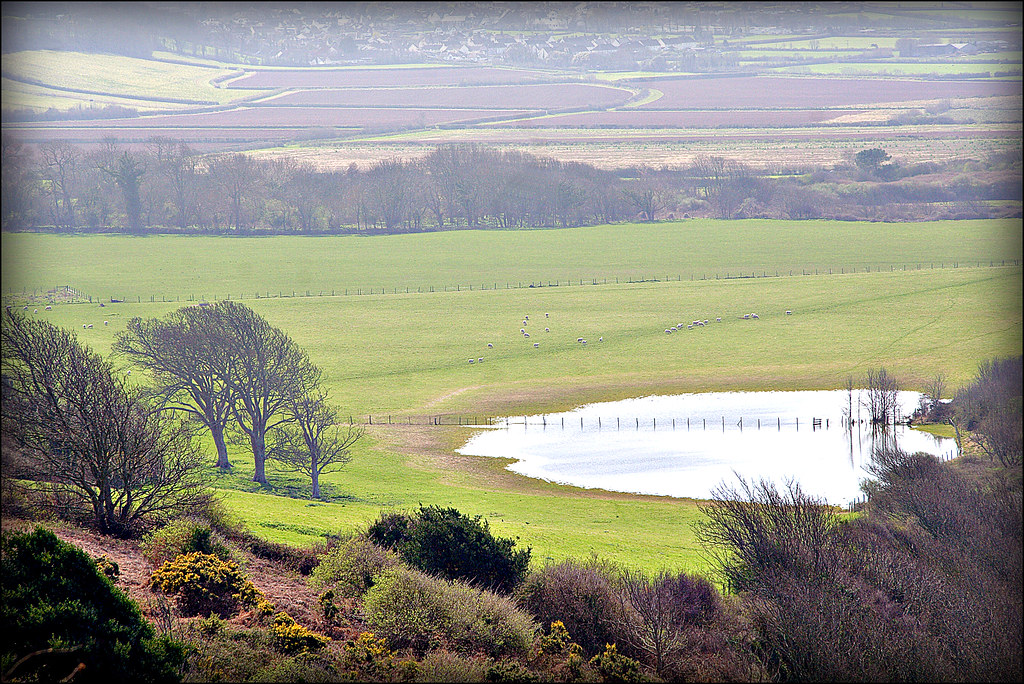.

Porlock Weir, Somerset: photo by Squirmella, 2004

Porlock Hill: photo by Matt Chapman, 2008


Kubla Khan, manuscript draft: Samuel Taylor Coleridge, between 1797 and 1816 (British Library)
Author's note on a manuscript copy of Kubla Khan:
This fragment with a good deal more, not recoverable, composed, in a sort of Reverie brought on by two grains of Opium taken to check a dysentery, at a Farm House between Porlock & Linton, a quarter of a mile from Culbone Church, in the fall of the year, 1797.
Author's note published with the poem in Christabel, Kubla Khan, and the Pains of Sleep (1816) :
The following fragment is here published at the request of a poet of great and deserved celebrity [i.e. Lord Byron], and, as far as the Author's own opinions are concerned, rather as a psychological curiosity, than on the ground of any supposed poetic merits.
In the summer of the year 1797, the Author, then in ill health, had retired to a lonely farm-house between Porlock and Linton, on the Exmoor confines of Somerset and Devonshire. In consequence of a slight indisposition, an anodyne had been prescribed, from the effects of which he fell asleep in his chair at the moment that he was reading the following sentence, or words of the same substance, in Purchas's Pilgrimage: "Here the Khan Kubla commanded a palace to be built, and a stately garden thereunto. And thus ten miles of fertile ground were inclosed (sic) with a wall." The Author continued for about three hours in a profound sleep, at least of the external senses, during which time he has the most vivid confidence, that he could not have composed less than from two to three hundred lines; if that indeed can be called composition in which all the images rose up before him as things, with a parallel production of the correspondent expressions, without any sensation or consciousness of effort. On awakening he appeared to himself to have a distinct recollection of the whole, and taking his pen, ink, and paper, instantly and eagerly wrote down the lines that are here preserved. At this moment he was unfortunately called out by a person on business from Porlock, and detained by him above an hour, and on his return to his room, found, to his no small surprise and mortification, that though he still retained some vague and dim recollection of the general purport of the vision, yet, with the exception of some eight or ten scattered lines and images, all the rest had passed away like the images on the surface of a stream into which a stone has been cast, but, alas! without the after restoration of the latter!

Samuel Taylor Coleridge: Pieter van Dyke, 1795 (National Portrait Gallery)





11 comments:
Tom,
"This fragment with a good deal more, not recoverable"
"all the rest had passed away like the images on the surface of a stream into which a stone has been cast"
2.16
pink cloud in pale blue sky above still
shadowed ridge, green of leaf on branch
in foreground, wave sounding in channel
time implicit in comparison,
as ‘instances of now’
object regarded in terms of
limits, exact, can be
grey-white of sky reflected in channel,
shadowed green of ridge across from it
Steve,
grey-white of sky
this morning here, too, with intermittent dashes of hail.
Puts one in mind, a bit, of the beach at Porlock.
Forlorn, forlorn, without that familiar Person.
It has been suggested that the Person was actually Coleridge's supplier of the "anodyne" (i.e. laudanum, opium).
Which might clear up this or that or, on the other hand, cloud over the Other.
It has been said, too, of the Person from Porlock that in Stevie Smith's poem he becomes "a person of the suburban middle classes like herself", and as such also a hero, relieving Coleridge (and us) from the burden of "Kubla Khan".
That about fits -- and to great extent also, perhaps, relieving the poet herself from the portentous burden of the reputation of Coleridge and his poem?
I woke up (actually having fallen soundly asleep -- finally -- a big change) this morning both early and late -- I needed to be at the airport by 5 am. The words and image on my mind were "out of road". The mental picture I had formed looked a lot like the photo of Porlock Weir. I marvel at this poem. It's so unlike anything else I know and it amazes how Smith quietly but definitely constructs a "big finish" conclusion. This moves me also because Kubla Khan was the first substantial poem I committed to memory. It was for an English assignment in early high school and I don't remember clearly what caused me to choose Kubla Khan, but I've always been glad I did because it has stayed with me always.
Curtis,
The images of Porlock were an illumination for me -- the place having always assumed in the imagination a sort of cloudy phantasmagoric character undoubtedly cast by the spell of Coleridge's poem.
Tom,
Yes, those images of Porlock (an actual place!, maybe also an actual person from Porlock? maybe delivering STC's anodyne?) help to make the poem somehow as real as its Author's Note seems to make it, just some ordinary event down there on the coast of Somerset. Rain coming down here, hail last night, ridge disappeared in clouds. . . .
2.17
light coming into sky above still black
plane of ridge, red-tailed hawk calling
in foreground, sound of wave in channel
way of thinking that is not
the same, today known
as a continuation, of train
of thought, almost as
silver of sunlight reflected in channel,
white cloud in pale blue sky on horizon
nice patch of purple heather (Exmoor photo)...
Yes, Bill, and one might even imagining the mysterious missing Person traversing it, trudging on the way to assert that famous (and convenient?) historical interruption.
Steve, and how (the rain)...intense here day through night since Monday, blinding downpours, hail spells
the same, today known
as a continuation, of rain
...all too, too reminiscent of the teeming night (two months ago yesterday) when those parking lot spikes made a cripple out of me.
(Celebrated the memorial by bravely hiding under the covers, but when I climbed out again... still pouring.)
"smile smile and get some work to do"...wonderful words...wonderful piece....thanks Tom!!
Yes, yes, that's what we ought to do, certainly.
You may be interested to know that Tom Lowenstein has recently brought to light a new journal of Mr Coleridge's ruminations on the great Khan, written at Ash Farm.
href="http://intercapillaryspace.blogspot.com/2011/02/i-have-in-my-hand-volume-which-is-new.html
Thanks, Michael. And like they say, small world.
Tom L. and I became friends very long ago at Cambridge and have kept in touch over the years, so he has been keeping me up to date on his remarkable inhabitation (shall we call it) of the persona of the author of Kubla Khan.
I appreciate the link to your interesting online journal excerpt from Tom's continuing work, and recommend it to others.
Post a Comment